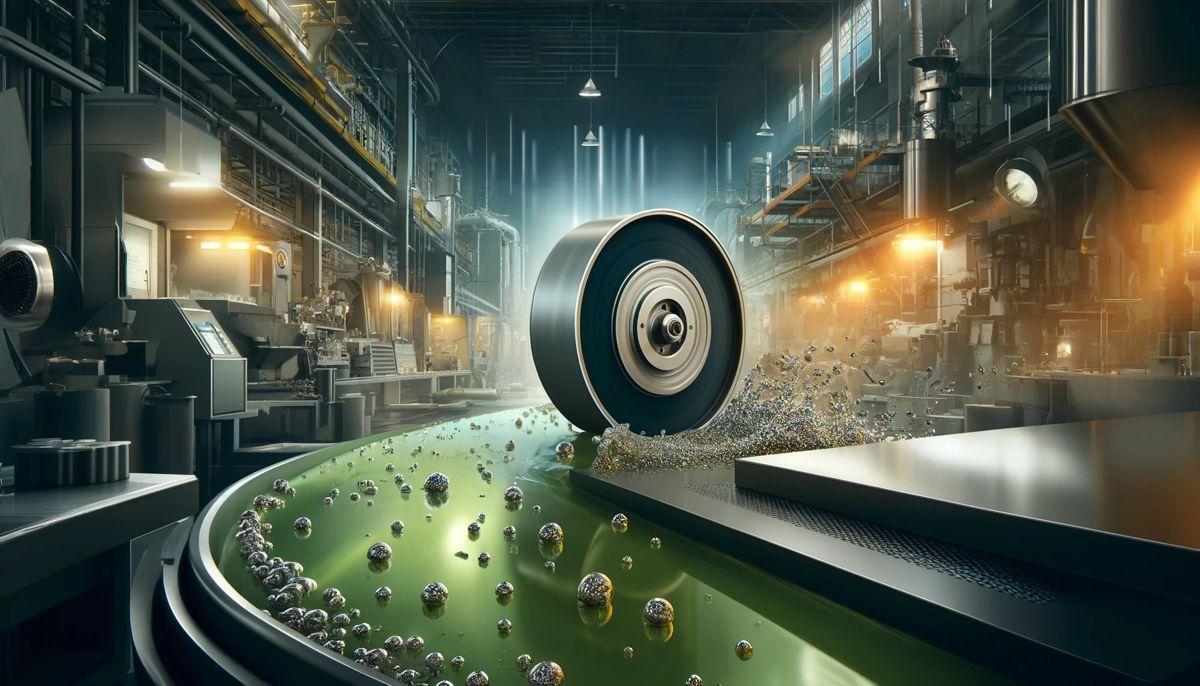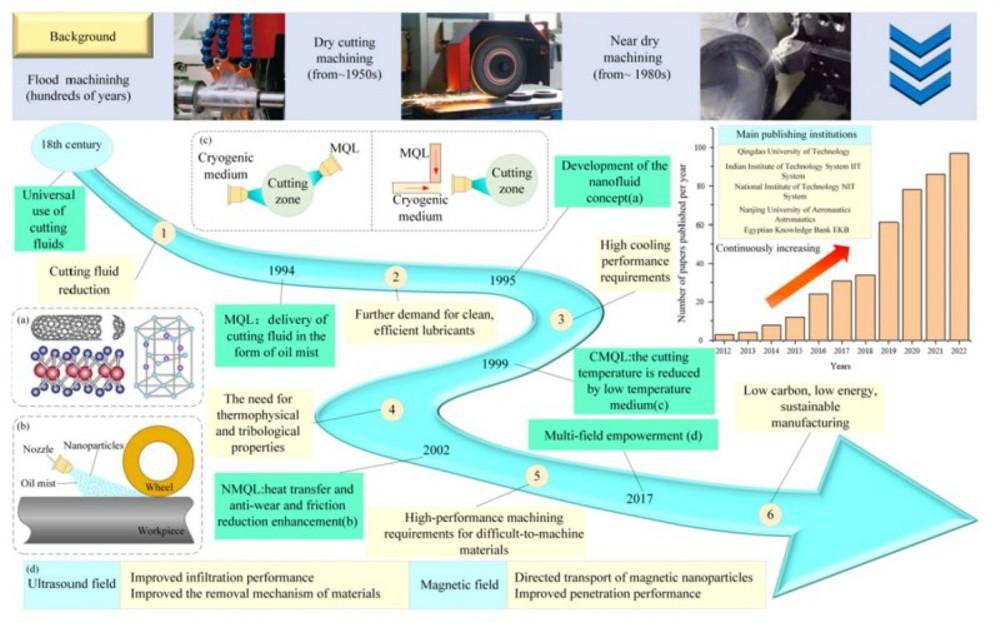R.E.News future Technology- NanoBioLubricants to make Industrial Grinding practices Eco-Friendly
 07/05/24-FR-English-NL-footer
07/05/24-FR-English-NL-footer
Des NanoBioLubricants pour rendre les pratiques de broyage industriel respectueuses de l'environnement

 Image- Chinese Academy of Sciences
Image- Chinese Academy of Sciences
Les processus de meulage traditionnels dépendent fortement de fluides de travail des métaux qui contiennent des produits chimiques nocifs, posant des risques importants pour l'environnement et la santé.
À mesure que l’industrie s’oriente vers la durabilité, il existe une demande croissante d’alternatives efficaces qui atténuent ces préoccupations. Les NanoBioLubricants, qui améliorent les huiles biodégradables avec des nanoparticules, constituent une solution viable. Ils visent à améliorer les performances de broyage tout en réduisant considérablement l’empreinte écologique.
Une revue récente publiée dans Advances in Manufacturing le 9 mars 2024 met en évidence des avancées significatives dans l'utilisation des NanoBioLubricants pour les opérations de broyage, présentant une approche durable et efficace qui intègre de manière transparente la conscience environnementale et la performance industrielle.
Ces lubrifiants innovants utilisent des nanoparticules pour améliorer les propriétés des fluides à base d'huile végétale, offrant ainsi un double avantage de lubrification supérieure et de sécurité environnementale. La recherche détaille comment les nanoparticules telles que l'oxyde de silicium et le bisulfure de molybdène, connues pour leur conductivité thermique élevée et leurs capacités filmogènes robustes, sont intégrées dans les biolubrifiants pour améliorer considérablement les taux de transfert de chaleur et réduire la friction à l'interface de broyage.
Cette synthèse de nanoparticules avec des biolubrifiants préserve non seulement l'intégrité physique des meules mais évite également la dégradation thermique de la pièce, garantissant ainsi des opérations plus fluides et prolongeant la durée de vie des outils de fabrication. De plus, l’étude met en évidence le rôle de ces nanoparticules dans la formation d’une couche lubrifiante chimiquement et physiquement stable qui résiste aux conditions extrêmes du broyage industriel.
Le Dr Chang-He Li, chercheur principal impliqué dans l'étude, souligne : « Nos recherches démontrent que les NanoBioLubricants peuvent améliorer considérablement la dynamique thermique et de friction à l'interface meule-pièce. Cela améliore non seulement les performances de broyage, mais réduit également considérablement la consommation d'énergie et l'impact environnemental.
Cette technologie s'aligne non seulement sur les objectifs environnementaux mondiaux, mais permet également de réaliser d'importantes économies de coûts d'exploitation, établissant ainsi une nouvelle norme en matière de pratiques industrielles respectueuses de l'environnement. Alors que les industries du monde entier s’efforcent de trouver des solutions plus écologiques, l’adoption des NanoBioLubricants pourrait marquer une étape cruciale dans la promotion d’un paysage manufacturier plus durable et responsable.
NJC.© Info Chinese Academy of Sciences
----------------------------------------------------------------------------------------------------------------
 07/05/24-English
07/05/24-English
NanoBioLubricants to make Industrial Grinding practices Eco-Friendly

 Image- Chinese Academy of Sciences
Image- Chinese Academy of Sciences
Traditional grinding processes heavily depend on metalworking fluids that contain harmful chemicals, posing significant environmental and health risks.
As the industry shifts toward sustainability, there is an increasing demand for efficient alternatives that mitigate these concerns. NanoBioLubricants, which enhance biodegradable oils with nanoparticles, provide a viable solution. They aim to enhance grinding performance while substantially reducing ecological footprints.
A recent review published in Advances in Manufacturing on March 9, 2024, highlights significant advancements in the use of NanoBioLubricants for grinding operations, showcasing a sustainable and efficient approach that seamlessly integrates environmental consciousness with industrial performance.
These innovative lubricants utilize nanoparticles to enhance the properties of vegetable oil-based fluids, offering a dual benefit of superior lubrication and environmental safety. The research details how nanoparticles such as silicon oxide and molybdenum disulphide, known for their high thermal conductivity and robust film-forming abilities, are integrated into biolubricants to significantly improve heat transfer rates and reduce friction at the grinding interface.
This synthesis of nanoparticles with biolubricants not only preserves the physical integrity of grinding wheels but also prevents thermal degradation of the workpiece, thus ensuring smoother operations and extending the lifespan of manufacturing tools. Additionally, the study highlights the role of these nanoparticles in forming a chemically and physically stable lubrication layer that withstands the extreme conditions of industrial grinding.
Dr. Chang-He Li, a senior researcher involved in the study, emphasizes: “Our research demonstrates that NanoBioLubricants can drastically improve the thermal and friction dynamics at the grinding wheel-workpiece interface. This not only enhances the grinding performance but also significantly cuts down on energy consumption and environmental impact.”
This technology not only aligns with global environmental goals but also offers substantial cost savings in operations, setting a new standard for eco-friendly industrial practices. As industries worldwide strive for greener solutions, the adoption of NanoBioLubricants could mark a crucial step in fostering a more sustainable and responsible manufacturing landscape.
NJC.© Info Chinese Academy of Sciences
-----------------------------------------------------------------------------------------------------------------
 07/05/24-NL
07/05/24-NL
NanoBioLubricants om industriële maalpraktijken milieuvriendelijk te maken

 Image- Chinese Academy of Sciences
Image- Chinese Academy of Sciences
Traditionele slijpprocessen zijn sterk afhankelijk van metaalbewerkingsvloeistoffen die schadelijke chemicaliën bevatten, wat aanzienlijke risico's voor het milieu en de gezondheid met zich meebrengt.
Terwijl de industrie zich richting duurzaamheid verschuift, is er een toenemende vraag naar efficiënte alternatieven die deze zorgen wegnemen. NanoBioLubricants, die biologisch afbreekbare oliën verbeteren met nanodeeltjes, bieden een haalbare oplossing. Ze zijn gericht op het verbeteren van de maalprestaties en het aanzienlijk verkleinen van de ecologische voetafdruk.
Een recent overzicht, gepubliceerd in Advances in Manufacturing op 9 maart 2024, benadrukt de aanzienlijke vooruitgang in het gebruik van NanoBioLubricants voor slijpwerkzaamheden, en toont een duurzame en efficiënte aanpak die milieubewustzijn naadloos integreert met industriële prestaties.
Deze innovatieve smeermiddelen maken gebruik van nanodeeltjes om de eigenschappen van op plantaardige olie gebaseerde vloeistoffen te verbeteren, wat een dubbel voordeel biedt: superieure smering en milieuveiligheid. Het onderzoek beschrijft hoe nanodeeltjes zoals siliciumoxide en molybdeendisulfide, bekend om hun hoge thermische geleidbaarheid en robuuste filmvormende eigenschappen, worden geïntegreerd in biosmeermiddelen om de warmteoverdrachtssnelheden aanzienlijk te verbeteren en de wrijving op het slijpvlak te verminderen.
Deze synthese van nanodeeltjes met biosmeermiddelen behoudt niet alleen de fysieke integriteit van slijpschijven, maar voorkomt ook thermische degradatie van het werkstuk, waardoor soepelere bewerkingen worden gegarandeerd en de levensduur van productiegereedschappen wordt verlengd. Bovendien benadrukt de studie de rol van deze nanodeeltjes bij het vormen van een chemisch en fysisch stabiele smeerlaag die bestand is tegen de extreme omstandigheden van industrieel slijpen.
Dr. Chang-He Li, een senior onderzoeker betrokken bij het onderzoek, benadrukt: “Ons onderzoek toont aan dat NanoBioLubricants de thermische en wrijvingsdynamiek op het grensvlak van slijpschijf en werkstuk drastisch kunnen verbeteren. Dit verbetert niet alleen de maalprestaties, maar vermindert ook aanzienlijk het energieverbruik en de impact op het milieu.”
Deze technologie sluit niet alleen aan bij de mondiale milieudoelstellingen, maar biedt ook aanzienlijke kostenbesparingen bij de bedrijfsvoering, waardoor een nieuwe standaard wordt gezet voor milieuvriendelijke industriële praktijken. Terwijl industrieën wereldwijd streven naar groenere oplossingen, zou de adoptie van NanoBioLubricants een cruciale stap kunnen zijn in het bevorderen van een duurzamer en verantwoordelijker productielandschap.
NJC.© Info Chinese Academy of Sciences
--------------------------------------------------------------------------------------------------------------------
Date de dernière mise à jour : 06/05/2024

















